
 Brian Joyce
The Hockey Writers
Brian Joyce
The Hockey Writers
26
Reads
0
Comments
Every Stanley Cup Winner Since 1960
While nearly everything in the NHL has changed over the last 59 years, the goal has remained the same. Raising Lord Stanley’s Cup remains the prime objective of each player in the NHL each season. Here we will take a look back at every single Stanley Cup winner since 1960.
1960 NHL Stanley Cup Champions – Montreal Canadiens
1960 Runner-up: Toronto Maple Leafs (4-0)
This was the fifth year in a row that the Montreal Canadiens stood atop the NHL as the Stanley Cup champions. The team swept the Toronto Maple Leafs in the Stanley Cup Final, clinching the series with a 4-0 victory. Habs legend Maurice ‘The Rocket’ Richard retired following this season.
The most important part of this season was Jacques Plante’s introduction of the goalie mask as everyday equipment. On Nov. 1, 1959, Plante took a puck to the face, which forced him to leave the game to get stitches. When he returned he was wearing his home-made face-mask, which he had been using in practice at the time. Despite pushback from his head coach, Plante continued wearing the mask and the Canadiens went on to win 18 straight games.
Although he was not the first goalie to wear a face-mask, he popularized it. The first was Montreal Maroons goaltender Clint Benedict who only wore his mask for five games in 1930. The change would become Plante’s legacy and it was illustrated by SportsNet’s Patrick Hoffman who included it at the top of the list of the 10 events that changed hockey history.
1961 NHL Stanley Cup Champions – Chicago Black Hawks
1961 Runner-up: Detroit Red Wings (4-2)
Before the Toronto Maple Leafs had the longest Stanley Cup drought in the NHL currently at 52 years and counting, that dubious distinction belonged to Chicago. While they did not know it at the time, this would stand as Chicago’s last Stanley Cup for 49 years.
The Black Hawks won their series against the Detroit Red Wings 4-2, winning Game 6 in Detroit by a score of 5-1. Chicago was led by its offensive core comprised of Bobby Hull, Stan Mikita, Murray Balfour and Kenny Wharram, who combined for 43 points in their 12 playoff games. Pierre Pilote led all players in playoff scoring with 15 points.
1962-64 NHL Stanley Cup Champions – Toronto Maple Leafs
1962 Runner-up: Chicago Black Hawks (4-2)
1963 Runner-up: Detroit Red Wings (4-1)
1964 Runner-up: Detroit Red Wings (4-3)
A lifetime ago, the Toronto Maple Leafs were able to win three consecutive Stanley Cups. They defeated the Black Hawks in 1962, and beat the Detroit Red Wings in 1963 and 1964.
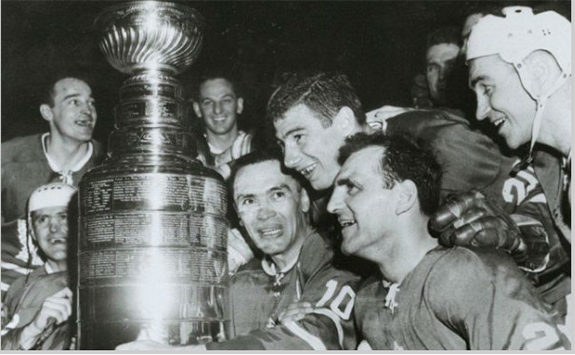
During these three seasons, the Maple Leafs were powered by their two best players, Frank Mahovolich and Dave Keon. Mahovolich scored a combined 199 points across the three seasons, while Keon combined for 177 points. Toronto’s offence also included Bob Nevin and future Hall of Famers George Armstrong, Dick Duff, Bob Pulford, and the late Red Kelly.
1965-66 NHL Stanley Cup Champions – Montreal Canadiens
1965 Runner-up: Chicago Black Hawks (4-3)
1966 Runner-up: Detroit Red Wings (4-2)
After five years, the Canadiens made their way back to the top of the NHL. They managed to take down the Black Hawks in seven games in 1965 and followed up by beating the Red Wings in six games in 1966.
The 1965 playoffs were especially significant because of the introduction of the Conn Smythe Trophy. The award would be given out to the player who was named the playoff MVP every year. The inaugural award would be given to NHL legend Jean Beliveau after he scored eight goals and eight assists in 13 games. The Conn Smythe Trophy remains listed as one of Beliveau’s great accomplishments.
1967 NHL Stanley Cup Champions – Toronto Maple Leafs
Runner-up: Montreal Canadiens (4-2)
Virtually all NHL fans know the winner of the 1967 Stanley Cup. This is because it would be the final time the Maple Leafs would hoist the Cup to date. They defeated the Montreal Canadiens in six games.
This championship is the most important to the franchise’s legacy. The Maple Leafs have become a punchline of the NHL since 1967, but at the time the team was simply enjoying their fourth championship in six years. The win marked the final time (to date) Toronto would even make the Stanley Cup Final, let alone win the Cup. The drought has lasted so long, the team could soon be removed from the physical Stanley Cup if they do not win it again in the next 12 years.
1968-69 NHL Stanley Cup Champions – Montreal Canadiens
1968 Runner-up: St. Louis Blues (4-0)
1969 Runner-up: St. Louis Blues (4-0)
After being defeated in the 1967 Stanley Cup Final by the Maple Leafs, the Canadiens returned to the top of the NHL. They swept the St. Louis Blues both times to win back-to-back championships.
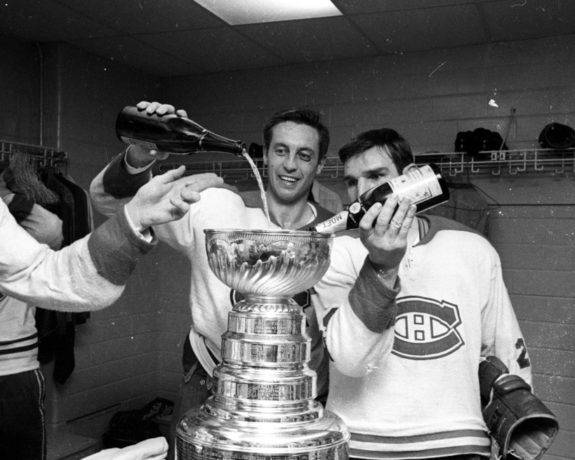
During the 1967-68 season, Jean Beliveau became only the second player to score 1,000 career points, the first being Gordie Howe. Toe Blake retired as head coach after the 1967-68 season. He finished his coaching career with eight Stanley Cups. Claude Ruel took over as head coach for the 1968-69 season. In his first season as head coach, the Canadiens won 46 games.
1970 NHL Stanley Cup Champions – Boston Bruins
Runner-up: St. Louis Blues (4-0)
The Boston Bruins won their first championship since 1941 while the St. Louis Blues were the runner-up for the third straight year. The Bruins swept the series, marking 12 straight Stanley Cup Final losses for the Blues.
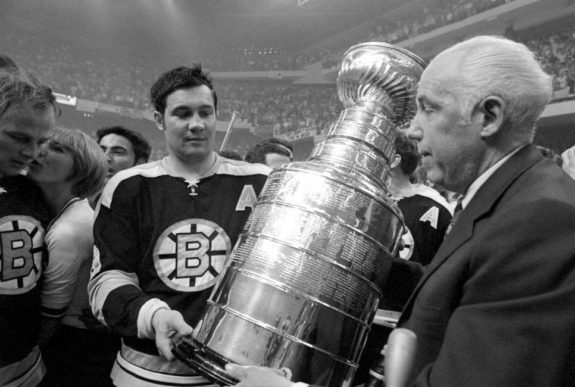
Bobby Orr led the league in points with 120. This was the first time a defenceman had ever scored over 100 points. Orr set a number of NHL records this season including the records for most assists with 87 and most goals by a defenceman with 33.
1971 NHL Stanley Cup Champions – Montreal Canadiens
Runner-up: Chicago Black Hawks (4-3)
As if they were a magnet for the Cup, the Canadiens found their way back to the Stanley Cup Final in 1971. They battled and defeated the Black Hawks in seven games.
Jean Beliveau reached another milestone this season, becoming just the fourth player to ever score 500 goals. This would be the final time Beliveau would appear in the Stanley Cup Final as a player. Ken Dryden made his debut with the Canadiens this season, taking over the role as the Habs’ No. 1 goaltender.
1972 NHL Stanley Cup Champions – Boston Bruins
Runner-up: New York Rangers (4-2)
The Stanley Cup continued to flip-flop between the Canadiens and the Bruins, this time landing in Boston. The Bruins defeated the Maple Leafs and Blues en route to their six-game series win over the Rangers.
Bobby Orr’s effect on the Bruins was on full display this season. Orr scored 37 goals and 80 assists for 117 points. He continued his dominance but the Bruins’ biggest offensive contributor this season was Phil Esposito. Esposito finished his regular season with 66 goals and 67 assists for 133 points. He finished first in the league in scoring for the third year in a row and would go on to lead the league in scoring for the next three seasons as well.
1973 NHL Stanley Cup Champions – Montreal Canadiens
Runner-up: Chicago Black Hawks (4-2)
The five-year game of hot potato with the Stanley Cup ended with the Canadiens winning it in 1973. They defeated the Buffalo Sabres who were making their playoff debut, before beating the Philadelphia Flyers to make it to the Stanley Cup Final. They downed the Black Hawks in six games to win their 18th championship.
Montreal had a new coach when they won it all this time, and what a coach he was. Scotty Bowman began the 1972 season as the Habs head coach and the very next season he won his first championship. Rest assured, his name will pop up on this list again.
1974-75 NHL Stanley Cup Champions – Philadelphia Flyers
1974 Runner-up: Boston Bruins (4-2)
1975 Runner-up: Buffalo Sabres (4-2)
The Philadelphia Flyers made history by becoming the first non-Original Six team to win the Stanley Cup. As historic a feat as this was, NHL fans are not likely to look back on these teams with rose-colored glasses.
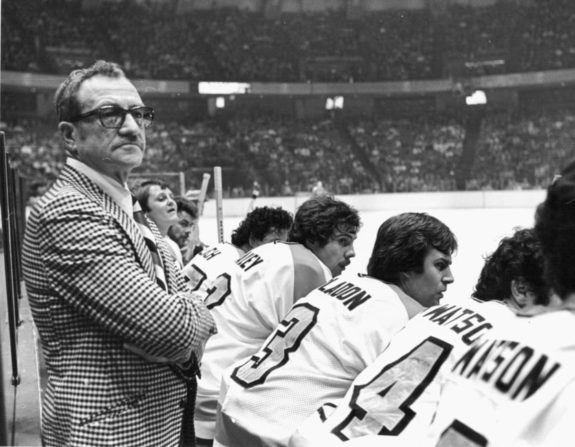
Dubbed the Broad Street Bullies, these Flyers were some of the roughest and toughest the NHL has ever seen. So much so that during The Simpsons “Treehouse of Horror IV” The Devil summoned the 1975 Philadelphia Flyers to join his “Jury of the Damned”.
1976-79 NHL Stanley Cup Champions – Montreal Canadiens
1976 Runner-up: Philadelphia Flyers (4-0)
1977 Runner-up: Boston Bruins (4-0)
1978 Runner-up: Boston Bruins (4-2)
1979 Runner-up: New York Rangers (4-1)
The Montreal Canadiens have had a number of dynasties over their century-long history. Their late-70s run of four Stanley Cups in a row stands as perhaps their most impressive.
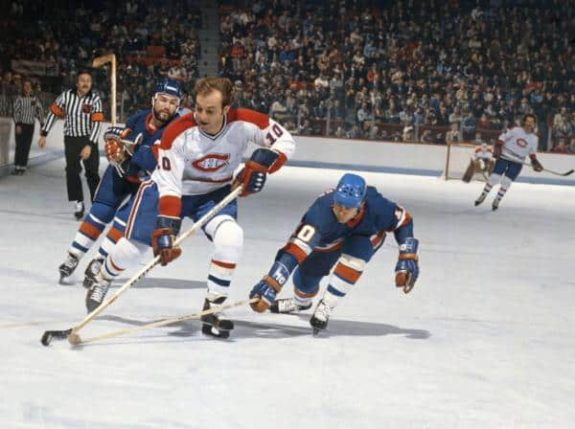
The Canadiens had been able to keep dynasties going longer in the past, but this dynasty was forced to win more high-pressure games than ever before. Due to the changes in the playoff format, these Habs had to win three series each year to hoist the Stanley Cup. Scotty Bowman coached the Habs to the championship four years in a row. The team was now led by Guy Lafleur, who went on to become the franchise’s all-time points leader. This would be the last great run of the Montreal Canadiens – while they would win Cups again, it would never be through the sheer dominance they displayed here.
1980-83 NHL Stanley Cup Champions – New York Islanders
1980 Runner-up: Philadelphia Flyers (4-2)
1981 Runner-up: Minnesota North Stars (4-1)
1982 Runner-up: Vancouver Canucks (4-0)
1983 Runner-up: Edmonton Oilers (4-0)
From one dynasty to the next. The New York Islanders took the task of winning four straight championships and ramped it up a notch. The playoff format changed once again, adding a fourth round to the playoff bracket. This meant that to win four straight Stanley Cups the Islanders had to win 16 straight playoff series. The NHL itself has the Islanders’ win over Wayne Gretzky’s Edmonton Oilers in 1983 in contention for the NHL’s greatest moment.
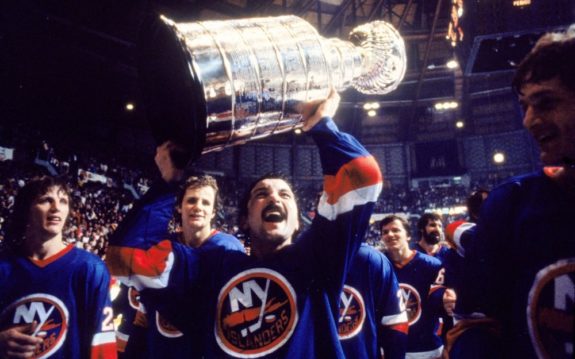
Leading the charge was the combination of the Islanders’ all-time leader in points Bryan Trottier and one of hockey’s all-time best goal-scorers Mike Bossy. The pair were inseparable and made the Islanders a powerhouse for nearly half a decade.
1984-85 NHL Stanley Cup Champions – Edmonton Oilers
1984 Runner-up: New York Islanders (4-1)
1985 Runner-up: Philadelphia Flyers (4-1)
Despite being swept by the Islanders in the 1983 Stanley Cup Final, the Edmonton Oilers came back to win back-to-back Cups. It was as if they were destined for greatness, these were the first two of the Oilers five Cups in seven seasons.
Wayne Gretzky led this team, but he had the benefit of having an incredible supporting cast. Mark Messier, Paul Coffey and Grant Fuhr all found their way onto the NHL’s Top 100 Players list in 2017 and into the Hockey Hall of Fame. All four of those players playing on the same team contributed to their immense success. The 1985 Oilers were voted the greatest team in NHL history by the NHL in 2017.
1986 NHL Stanley Cup Champions – Montreal Canadiens
Runner-up: Calgary Flames (4-1)
The Canadiens managed to find their way to the top of the NHL once again in 1986, knocking off the Calgary Flames in five games. Calgary had defeated the Oilers in the second round, putting Edmonton’s reign of dominance on hold.
The playoffs were highlighted by the standout performance of one young man. Patrick Roy, the Canadiens rookie goaltender, put on an incredible performance and was the foundation of their eventual victory. At 20 years old, he was named the youngest recipient of the Conn Smythe Trophy ever.
1987-88 NHL Stanley Cup Champions – Edmonton Oilers
1987 Runner-up: Philadelphia Flyers (4-3)
1988 Runner-up: Boston Bruins (4-0)
Back on top. After the disappointment of being eliminated in the 1986 playoffs, the Oilers rebounded to win another two Stanley Cups in a row.
The Oilers owned the back-half of the 1980s. With their extremely talented core, they were breaking records consistently. While the 1985 Oilers were voted the best team in NHL history, the 1987 and 1988 Oilers were also named the fifth and fourth best teams ever, respectively. It would not last much longer, as the 1988 Stanley Cup would be Gretzky’s last – he was traded that summer to the Los Angeles Kings in what would simply be known as “The Trade”.
1989 NHL Stanley Cup Champions – Calgary Flames
Runner-up: Montreal Canadiens (4-2)
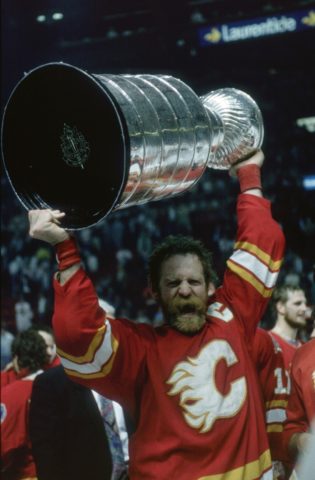
The Calgary Flames were finally able to take their turn atop Alberta hockey and the rest of the NHL in 1989. The Flames defeated Wayne Gretzky’s L.A. Kings en route to their Stanley Cup Final against the Canadiens. This is the final time to date that two Canadian teams have competed for the championship.
The Flames entered the season having made a blockbuster trade. Following their elimination from the playoffs the year prior, Calgary dealt Mike Bullard to the St. Louis Blues for a package including Doug Gilmour. Gilmour helped fortify the Flames offensive core and the team responded by winning 24 of its first 28 games that season.
1990 NHL Stanley Cup Champions – Edmonton Oilers
Runner-up: Boston Bruins (4-1)
Of all the Stanley Cups the Oilers won, this one is perhaps the most impressive. Affected by the departures of Wayne Gretzky and head coach/general manager Glen Sather, the Oilers managed to regroup with Mark Messier now acting as captain.
Messier’s role on the ice changed without Gretzky. Now the team’s top forward, his game changed to feature even more finesse than it had before. He led the team with 45 goals and 84 assists to combine for 129 points. He won the Hart Trophy as the league MVP and gave the Oilers their last Stanley Cup to date.
1991-92 NHL Stanley Cup Champions – Pittsburgh Penguins
1991 Runner-up: Minnesota North Stars (4-2)
1992 Runner-up: Chicago Blackhawks (4-0)
They may have started slow in 1990-91 but the Pittsburgh Penguins managed to finish strong and win back-to-back Stanley Cups. Mario Lemieux and Jaromir Jagr combined to form one of the most dynamic duos in NHL history.
Lemieux started the 1990-91 season recovering from a back injury that had cut his prior season short. After they got him back, the Penguins started rolling. They acquired Ron Francis from the Hartford Whalers and rode the success of their core to the championship. They had to trade star defenceman Paul Coffey the following season but the Penguins still managed to make it back to the top of the NHL by the year’s end.
1993 NHL Stanley Cup Champions – Montreal Canadiens
Runner-up: Los Angeles Kings (4-1)
The final time to date a Canadian team has won the Stanley Cup. The Canadiens stormed through the playoffs before defeating Gretzky’s Kings in five games.
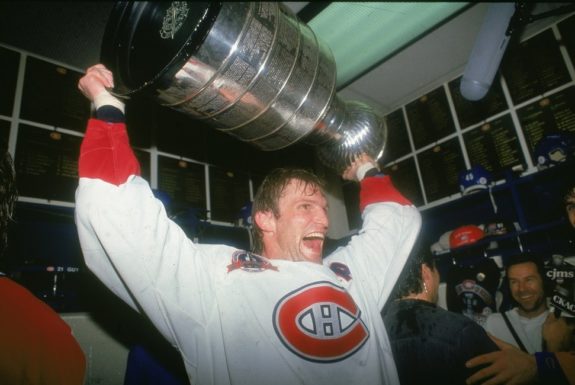
The Habs were led in the regular season and the playoffs by their star Vincent Damphousse. Damphousse led the team in scoring with 97 points and continued his production in the playoffs with another 23 points in only 20 games. Patrick Roy would once again win the Conn Smythe Trophy as playoff MVP, his second and final as a Canadien. Every year since, Canadians have been wondering who will be the team to break their Stanley Cup drought.
1994 NHL Stanley Cup Champions – New York Rangers
Runner-up: Vancouver Canucks (4-3)
Speaking of droughts, the New York Rangers 54-year Stanley Cup drought currently stands as the longest drought ever among active teams. Mark Messier was traded to New York prior to the 1991-92 season. He brought his championship pedigree with him as the captain of the Rangers.
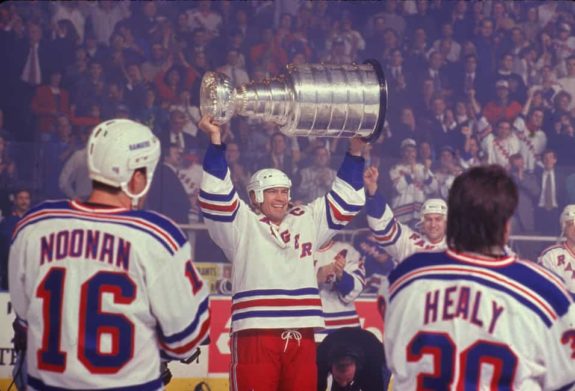
When the Rangers lost Game 5 of the Eastern Conference Final they were facing elimination. Messier famously guaranteed victory over the New Jersey Devils to his teammates and the New York media. Sure enough, the team battled back to win the series in seven games. After another hard-fought series with Vancouver, the Rangers finally ended their drought and won their first Stanley Cup since 1940.
1995 NHL Stanley Cup Champions – New Jersey Devils
Runner-up: Detroit Red Wings (4-0)
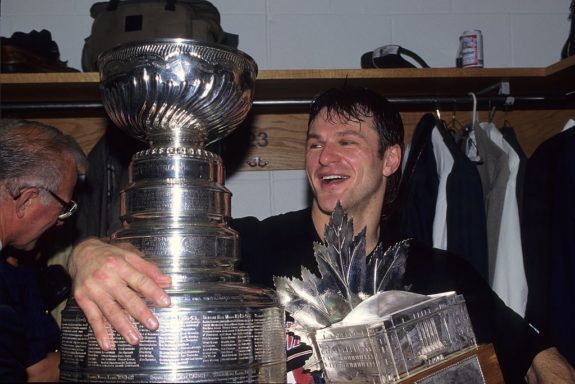
The NHL was shortened by a lockout this season, limiting the New Jersey Devils to only 48 games. Despite the short season, the Devils played well and made it to the Stanley Cup Final for the first time.
This marked the beginning of an era in the NHL that was dominated by three teams. The Devils, Red Wings and Avalanche took turns atop the NHL and it was started with this win by the Devils. This was the first championship in the Hall of Fame career of goaltender Martin Brodeur.
1996 NHL Stanley Cup Champions – Colorado Avalanche
Runner-up: Florida Panthers (4-0)
In their first season in Colorado, the Avalanche made it to the top of the mountain. After experiencing minimal success in Quebec, the Nordiques moved to Colorado where they would achieve much more.
The Avalanche eliminated the Presidents’ Trophy-winning Detroit Red Wings in the Eastern Conference Final before sweeping the Florida Panthers to win their first Stanley Cup. After an infamous game against the Detroit Red Wings where he allowed nine goals on 26 shots, Patrick Roy demanded a trade from the Montreal Canadiens. Roy was then traded to the Avalanche where he immediately solidified the team between the pipes.
1997-98 NHL Stanley Cup Champions – Detroit Red Wings
1997 Runner-up: Philadelphia Flyers (4-0)
1998 Runner-up: Washington Capitals (4-0)
After winning four championships with the Montreal Canadiens and one with the Pittsburgh Penguins, head coach Scotty Bowman turned his attention to winning with the Detroit Red Wings. In 1997 and 1998, Bowman coached the Red Wings to their first Stanley Cups since 1955.
During the 1997-98 season, Red Wings forward Sergei Fedorov was engaged in a contract holdout as an RFA. He signed an offer sheet with the Carolina Hurricanes worth up to $38 million with bonuses included. The Red Wings matched the offer and Fedorov signed on Feb. 26, 1998. His contract was worth $12 million for signing, $2 million for playing 21 regular season games, and $12 million for the Red Wings reaching the Western Conference Final. His $28 million remains the highest single-season payout in NHL history.
1999 NHL Stanley Cup Champions – Dallas Stars
Runner-up: Buffalo Sabres (4-2)
After 26 years and two failed Stanley Cup Final appearances, the Minnesota North Stars relocated to Dallas. Now named the Dallas Stars, the team managed to win their first championship in their sixth season in Dallas.
This series is best remembered for its controversial conclusion. As the Stars and Sabres battled in triple-overtime of Game 6, Dallas forward Brett Hull drove the net and scored the game-winning goal. His left skate had been in the crease, leaving Sabres coach Lindy Ruff livid at the call. The NHL declared that the call on the ice was the correct one as Hull had continuous possession of the puck as he entered the crease. The game has become known as the “No Goal Game”.
2000 NHL Stanley Cup Champions – New Jersey Devils
Runner-up: Dallas Stars (4-2)
The Devils had failed to recapture the success that won them the 1995 Stanley Cup in the years that followed. They experienced early playoff exits in the four seasons after their win. When the team reacquired Claude Lemieux in Nov. 1999 they appeared ready for another run at the Cup.
This matchup featured the first time two teams that had both relocated competed against each other in the Stanley Cup Final. The Dallas Stars had previously been the Minnesota North Stars while the New Jersey Devils were previously the Colorado Rockies.
2001 NHL Stanley Cup Champions – Colorado Avalanche
Runner-up: New Jersey Devils (4-3)
The Avalanche won their second Stanley Cup in their second trip to the Final in 2001. The team was led by Joe Sakic in virtually every offensive category en route to their championship victory.
Bruins legend Ray Bourque had played his entire career with Boston and had never won it all. In 2001, he was traded to the Avalanche for the chance to finally hoist the Stanley Cup. The Avalanche defeated the Devils in a seven-game series and Bourque became the first player to raise the Cup before his team’s captain as Sakic showed his respect to the future Hall of Famer.
2002 NHL Stanley Cup Champions – Detroit Red Wings
Runner-up: Carolina Hurricanes (4-1)
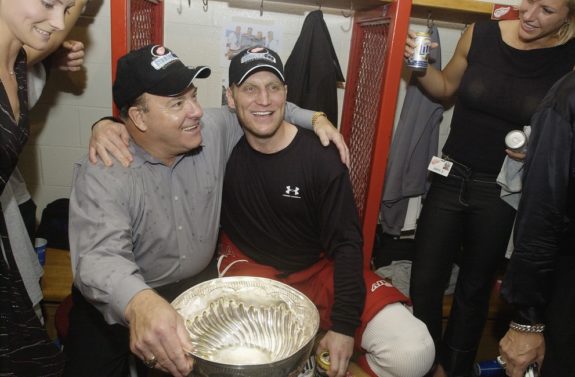
After a first-round exit against the Los Angeles Kings in 2001, the Red Wings were poised to make big changes. They traded for Dominik Hasek and signed Brett Hull and Luc Robitaille to bolster an already impressive roster with three future Hall of Famers.
This Red Wings team is considered one of the best in NHL history. On one team you had Brett Hull, Luc Robitaille, Brendan Shanahan, Steve Yzerman, Chris Chellios, Nicklas Lidstrom, Sergei Fedorov, Igor Larionov, Pavel Datsyuk, and Dominik Hasek. Larionov is the only member of that core not currently in the Hall of Fame. Throw in Scotty Bowman coaching his final season and you had the recipe for a legendary team.
2003 NHL Stanley Cup Champions – New Jersey Devils
Runner-up: Mighty Ducks of Anaheim (4-3)
The Devils missed out on the Stanley Cup Final in 2002 but rebounded to make it back to the Final for the third time in four years. Patrik Elias led the team in goals and points with 28 and 57 respectively.
This marked the third time in history and the first time since 1965 that the home team won every game in the Final. As the Devils defeated the Ducks 3-0 in Game 7, New Jersey’s Michael Rupp was credited with the game-winning goal. It was the first time a player’s first playoff goal had been the Stanley Cup-clinching goal.
2004 NHL Stanley Cup Champions – Tampa Bay Lightning
Runner-up: Calgary Flames (4-3)
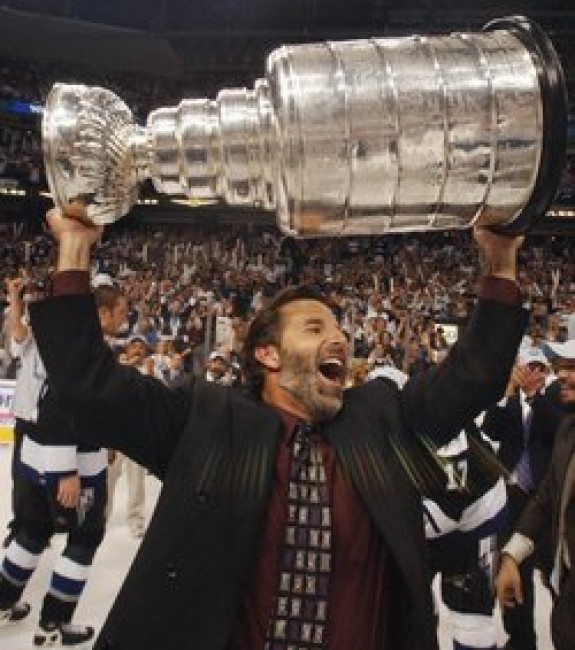
While the Flames were attempting to become the first Canadian team to win the Stanley Cup since the 1993 Montreal Canadiens, the Tampa Bay Lightning were simply too big a force to take down.
The Lightning were led by Martin St. Louis to their first and only championship in franchise history. Lightning goalie Nikolai Khabibulin played a big role in their Game 7 win. After allowing a Calgary goal in the second period, Khabibulin stopped all 16 shots he faced allowing Tampa Bay to hold on to a 2-1 to win the game and the series.
2005 NHL Stanley Cup Champions – No One (Lockout)
The NHL’s most disruptive lockout occurred in 2005 when it led to the cancelation of the Stanley Cup Playoffs. Beginning three months after the conclusion of the 2004 Stanley Cup Final, the lockout lasted over 10 months with the league not returning to play until the 2005-06 season.
2006 NHL Stanley Cup Champions – Carolina Hurricanes
Runner-up: Edmonton Oilers (4-3)
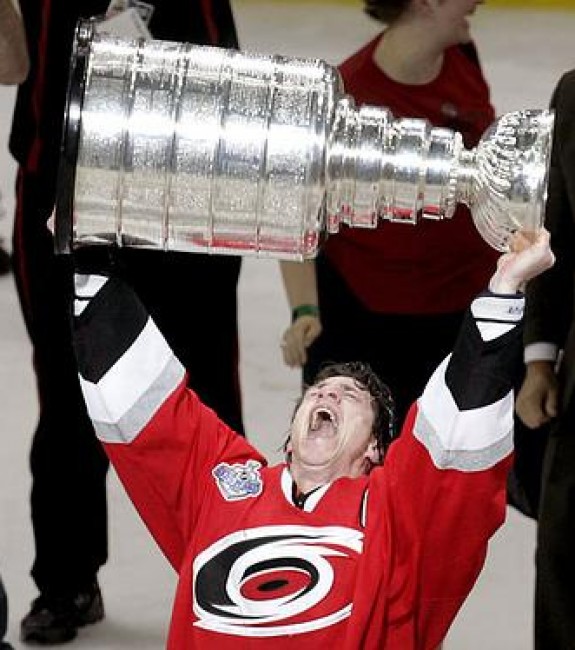
The Carolina Hurricanes made up for their failure in 2002 by winning their first and only championship in 2006. They defeated the Edmonton Oilers who were making their first Stanley Cup Final appearance since winning the Cup in 1990.
This was the first and only time to date that two former WHA teams competed in the Stanley Cup Final. The Hurricanes became only the third former WHA team to win the Cup, following the Oilers and the Colorado Avalanche.
2007 NHL Stanley Cup Champions – Anaheim Ducks
Runner-up: Ottawa Senators (4-1)
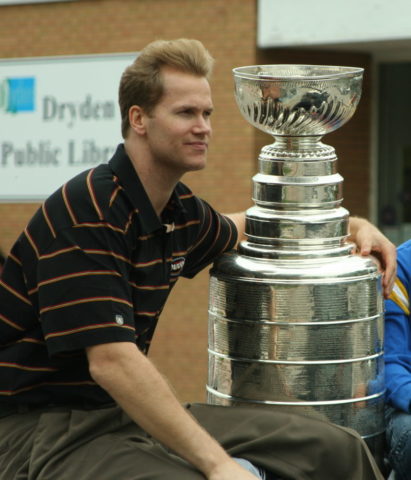
In their first season as the renamed Anaheim Ducks, the team made it to their second Stanley Cup Final and captured their only Cup in franchise history. They defeated the Ottawa Senators in five games in Ottawa’s only Final appearance to date.
The Ducks began their season having traded for future Hall of Fame defenceman Chris Pronger. Pronger beefed up the Ducks blue line and the team quickly became a betting favourite to win the Stanley Cup. Led offensively by Teemu Selanne and backed up by Jean-Sebastian Giguere in net, the Ducks were a formidable team that fought their way through a game Senators team.
2008 NHL Stanley Cup Champions – Detroit Red Wings
Runner-up: Pittsburgh Penguins (4-2)
The 2008 Detroit Red Wings were a different cast of characters than the team that had won the Stanley Cup in 2002. Mike Babcock had taken his place as head coach while Henrik Zetterberg had emerged as one of the teams offensive leaders.
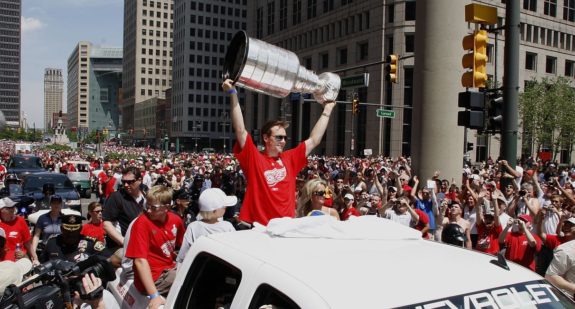
When the Red Wings lost back-to-back games to the Nashville Predators in the first round of the playoffs, Babcock benched goaltender Dominik Hasek in favour of Chris Osgood. The decision would pay off as Osgood helped the team win their next nine straight games and eventually the Stanley Cup.
2009 NHL Stanley Cup Champions – Pittsburgh Penguins
Runner-up: Detroit Red Wings (4-3)
When Sidney Crosby was drafted first overall by the Penguins in 2005 they knew they were getting something special. He joined a team that had fallen on hard times both professionally and financially but through the growth of their star players they soon returned to glory.
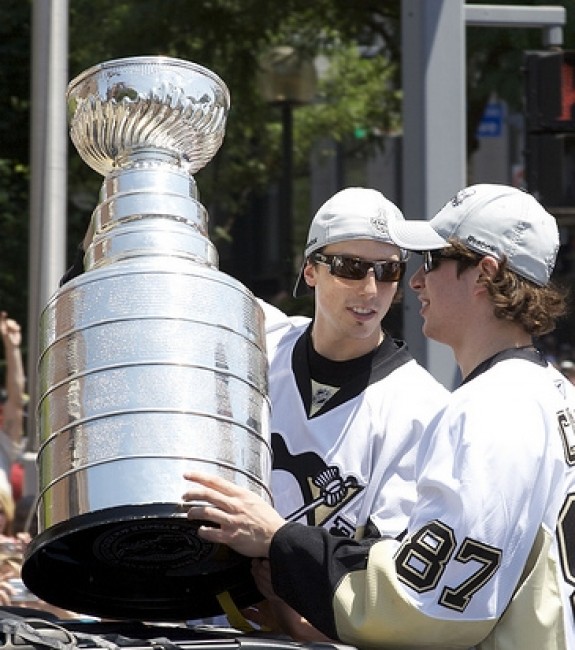
They had failed to beat the Red Wings in the 2008 Stanley Cup Final, but one year later they got a second chance. The dynamic duo of Crosby and Evgeni Malkin combined for 216 points that season while the Penguins were backed up by goaltender Marc-Andre Fleury. Malkin scored 36 points in the playoffs leading to him becoming the first Russian-born Conn Smythe Trophy winner.
2010 NHL Stanley Cup Champions – Chicago Blackhawks
Runner-up: Philadelphia Flyers (4-2)
By the time 2010 rolled around the Chicago Blackhawks owned the longest championship drought in the NHL. It had been 49 years since they won the Cup in 1961 but the new-look Blackhawks were led by a pair of exceptional forwards to the top of the NHL.
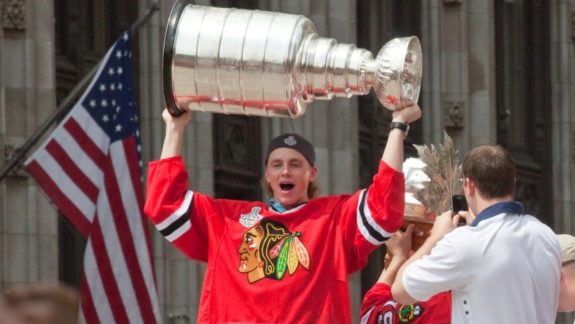
Patrick Kane and Jonathan Toews were the pieces that the Blackhawks had been missing for so long. Toews would be named the team’s captain and Kane would lead the team in scoring. In overtime of Game 6 of the Stanley Cup Final, Kane buried a shot that no one in the building saw go in except him. The puck was in, their drought was over and Patrick Kane still hasn’t forgotten it.
2011 NHL Stanley Cup Champions – Boston Bruins
Runner-up: Vancouver Canucks (4-3)
This was the final time to date that a Canadian team competed in the Stanley Cup Final. The Canucks were the Presidents’ Trophy winners and were looking to win their first championship in franchise history. The Bruins battled back in the series twice to eventually win the Cup in seven games.
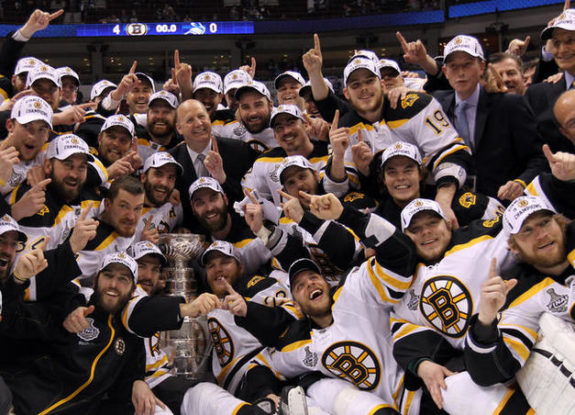
While this year may be most remembered for the riots that occurred in Vancouver after Game 7, the Bruins iced a strong team which resulted in their eventual Cup win. Goaltender Tim Thomas won the Conn Smythe Trophy as playoff MVP while Boston’s offence was led by David Krejci, Patrice Bergeron and Brad Marchand.
2012 NHL Stanley Cup Champions – Los Angeles Kings
Runner-up: New Jersey Devils (4-2)
The Kings were the star of the NHL’s Cinderella story in 2012. They entered the playoffs as the eighth seed in the Western Conference yet they went on to become the second team ever to eliminate the first, second and third-seeded teams in a single postseason. The other was the 2004 Calgary Flames.
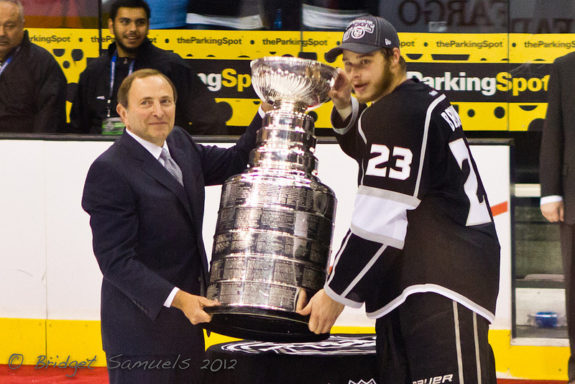
They defeated the Devils to win their first Stanley Cup in franchise history. The Kings became the second ever eighth-seeded team to make it to the Stanley Cup Final and the first and only eighth seed to win the Cup in NHL history. Trade deadline pickup Jeff Carter scored the game-winning-goal in Game 6 to help the Kings capture the championship.
2013 NHL Stanley Cup Champions – Chicago Blackhawks
Runner-up: Boston Bruins (4-2)
The 2013 NHL season was shortened due to the league’s most recent lockout. The lockout limited the Chicago Blackhawks to only 48 regular season games and they finished with a 36-7-5 record. They won the Presidents’ Trophy and are currently the final Presidents’ Trophy winner to win the Stanley Cup.
Due to the lockout, the regular season only featured games played within the two conferences. Therefore the Blackhawks did not play an Eastern Conference team until they faced the Boston Bruins in the Final. Patrick Kane led the team in the playoffs with 19 points en route to winning the Conn Smythe Trophy and the Stanley Cup.
2014 NHL Stanley Cup Champions – Los Angeles Kings
Runner-up: New York Rangers (4-1)
The Los Angeles Kings returned to the Stanley Cup Final after winning the Cup in 2012. This time they faced the New York Rangers who had defeated the Montreal Canadiens in the Eastern Conference Final. The Kings were propelled by the offensive performances of Anze Kopitar, Jeff Carter and Justin Williams who combined for 76 playoff points.
There were a number of anomalies during the Kings’ run to the championship. They became only the fourth team in NHL history to win a series after being down 3-0 when they defeated the San Jose Sharks in the first round. They then became the first team to make it to the Stanley Cup Final after winning each of their first three series in seven games.
2015 NHL Stanley Cup Champions – Chicago Blackhawks
Runner-up: Tampa Bay Lightning (4-2)
The Blackhawks returned to the Stanley Cup Final for the third time in six seasons. This time they faced the Tampa Bay Lightning led by Steven Stamkos. They won the series in six games, marking the first time since 1938 that the Blackhawks won the Cup on home ice.
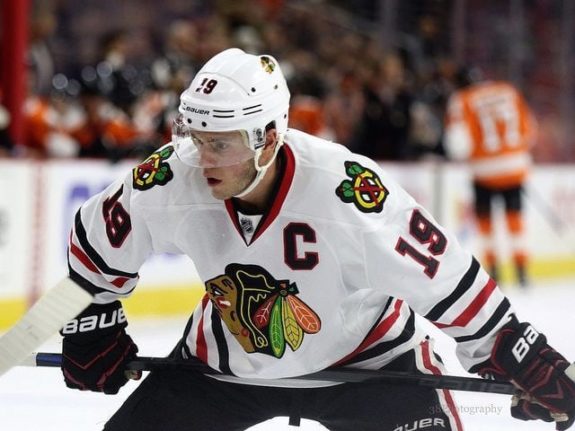
While Patrick Kane led the Blackhawks in playoff scoring with 11 goals and 12 assists, it was Duncan Keith who took home the Conn Smythe Trophy. Keith had 21 points including the game-winning goal in Game 6 of the Stanley Cup Final. This was the first time a defenceman won the Conn Smythe Trophy since Scott Niedermayer accomplished the feat in 2007.
2016-17 NHL Stanley Cup Champions – Pittsburgh Penguins
2016 Runner-up: San Jose Sharks (4-2)
2017 Runner-up: Nashville Predators (4-2)
The Pittsburgh Penguins reinforced their offence when they acquired Phil Kessel from the Toronto Maple Leafs following the 2015 season. Kessel joined a lineup that still featured Sidney Crosby and Evgeni Malkin and their combined offensive impact led the way to the Penguins’ Stanley Cup victories.
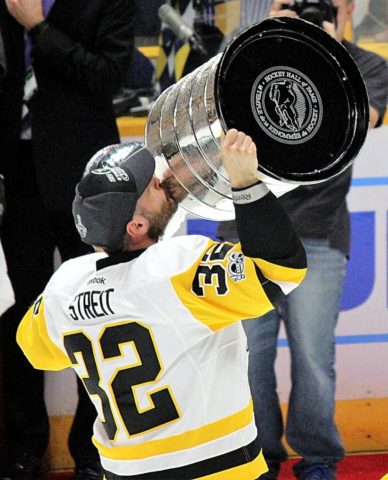
The Penguins became the only team in the salary cap era to win back-to-back championships. It was the first time any team had accomplished the feat since the Detroit Red Wings won the Cup in 1997 and 1998. Sidney Crosby won the Conn Smythe Trophy in both years, becoming the first player to win back-to-back Conn Smythe Trophies since Mario Lemieux did it in 1991 and 1992.
2018 NHL Stanley Cup Champions – Washington Capitals
Runner-up: Vegas Golden Knights (4-1)
This series was going to have a storybook ending no matter what. The Vegas Golden Knights made it to the Stanley Cup Final in their first season in the NHL. The Washington Capitals would be the ones to finally hoist the Cup as they won their first championship in franchise history.
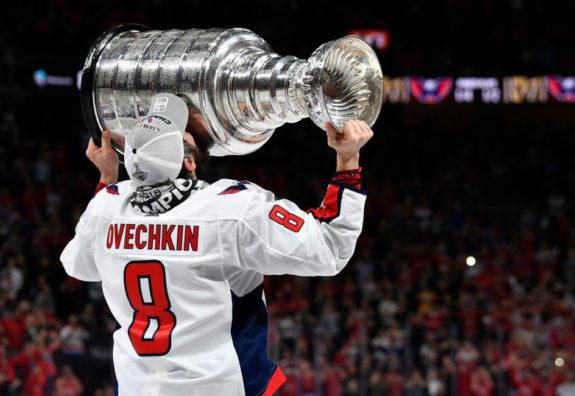
After years of failing to take the necessary steps towards playoff success, the Washington Capitals appeared to have taken a step backwards during the 2017-18 season. Their numbers were not conducive to a championship contender but once the playoffs started they became a totally different team. They played better than they had all year and it resulted in Alexander Ovechkin and the rest of the Capitals finally raising the Stanley Cup.
2019 NHL Stanley Cup Champions – St. Louis Blues
Runner-up: Boston Bruins (4-3)
The St. Louis Blues came into the league prior to the 1967-68 season. They made it to the Stanley Cup Final in their first three seasons as a franchise, yet were swept all three times. Fifty-two years after arriving in the NHL, the Blues defeated the Boston Bruins in seven games to win their first Stanley Cup.
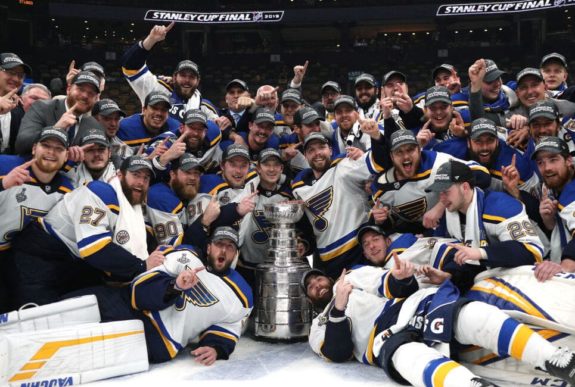
The Blues were dead last in the standings on Jan. 3, 2019. They had fired their head coach and had publicly considered trading their top players. Their destinies changed when the team called up rookie goaltender Jordan Binnington. Binnington blew away all expectations, putting up 24 wins in 32 games played. His efforts would lead the Blues to the playoffs and eventually to the Stanley Cup.
The post Every Stanley Cup Winner Since 1960 appeared first on The Hockey Writers.
Popular Articles

















































 Blackhawks Chicago
Blackhawks Chicago Panthers Florida
Panthers Florida Penguins Pittsburgh
Penguins Pittsburgh Rangers New York
Rangers New York Avalanche Colorado
Avalanche Colorado Kings Los Angeles
Kings Los Angeles Maple Leafs Toronto
Maple Leafs Toronto Bruins Boston
Bruins Boston Capitals Washington
Capitals Washington Flames Calgary
Flames Calgary Oilers Edmonton
Oilers Edmonton Golden Knights Vegas
Golden Knights Vegas Flyers Philadelphia
Flyers Philadelphia Senators Ottawa
Senators Ottawa Lightning Tampa Bay
Lightning Tampa Bay Red Wings Detroit
Red Wings Detroit Islanders New York
Islanders New York Sabres Buffalo
Sabres Buffalo Devils New Jersey
Devils New Jersey Hurricanes Carolina
Hurricanes Carolina Stars Dallas
Stars Dallas Jets Winnipeg
Jets Winnipeg Blue Jackets Columbus
Blue Jackets Columbus Predators Nashville
Predators Nashville Wild Minnesota
Wild Minnesota Blues St. Louis
Blues St. Louis Mammoth Utah
Mammoth Utah Ducks Anaheim
Ducks Anaheim Sharks San Jose
Sharks San Jose Canucks Vancouver
Canucks Vancouver


